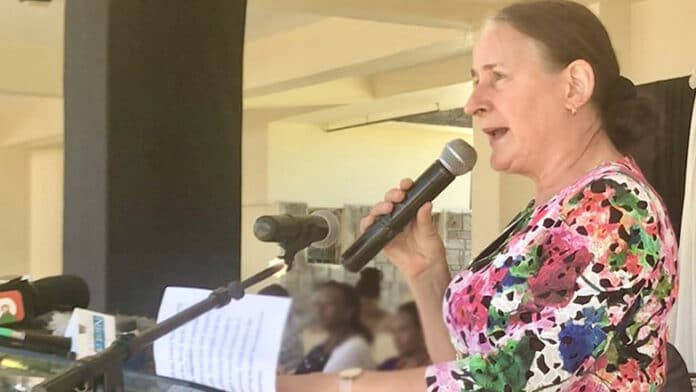On the occasion of World AIDS Day, which takes place on 1 December, UNRIC spoke to Dutch Dr Jantine Jacobi, UNAIDS Brussels representative, about solidarity, lessons learnt from the AIDS epidemic that can be applied to the COVID-19 crisis and issues that keep her awake at night.
HIV is a daily reality for 38 million people worldwide. In 2019, a total of 12.6 million people living with HIV did not have access to life-saving treatment; 1.7 million people acquired HIV, and 690,000 people died from AIDS-related illnesses.
The theme of this year’s World AIDS Day – ‘Global Solidarity, Shared Responsibility’ – is a stark reminder that we must further eliminate inequalities and human rights violations, including criminalisation, stigma and discrimination, to guarantee access to health care.
COVID-19 & HIV/AIDS: a story of mutual solidarity
At a time of ‘colliding pandemics’, UNAIDS is deploying its expertise as a co-lead of the ‘People’s vaccine initiative‘, a call for action to give all countries and people – including the poorest or most marginalised – access to a COVID-19 vaccine.
“Screening, testing and treatment should be freely available to all, including those without insurance; no country should be left behind. Protect human rights during the lockdown and support your health workers,” says Jacobi.
Recent studies suggest that obstacles to health care could lead to 500,000 additional deaths from AIDS. “We also see increasing stigma and discrimination among our target groups, for example sex workers or LGBTI people. If they have a health problem, they often get negative reactions and therefore do not seek health care,” Jacobi confirms.
Money is also flowing to other causes, but Jacobi believes it is logical funds are prioritised for the most immediate threat. UNAIDS Executive Director Winnie Byanyima framed it very clearly, recounts Jacobi: “We must do our part and use the lessons of HIV to ensure the COVID response goes well. International solidarity works both ways. And, of course, we have to achieve the Sustainable Development Goals.”

Increasing the attention span
“The challenge in Brussels is that HIV has disappeared from the radar. There is a crowding-out effect and the attention span for the epidemic, which is still large, is fading,” says Jacobi, who is trying to raise awareness by positioning HIV in EU policy documents, in the media or through events.
In cooperation with the European Parliament’s LGBTI Intergroup, UNAIDS is hosting a session on “HIV and Human Rights of LGBTI people, including equal access to PrEp (pre-exposure prophylaxis)” at the European Parliament on World AIDS Day with the support of WHO and NGO Aidsfonds. For LGBTI populations, inequalities and human rights violations mean the risk of acquiring HIV is 26 times higher among men who have sex with men.
“These injustices and missed opportunities keep me awake at night; I want to avoid situations where I would not be able to ensure everyone is on the same page.”
Women’s empowerment
During a medical internship in Indonesia, Jacobi witnessed first-hand the impact of social environment on the right and access to health care, “it determines the quality of your life,” she tells us. Jacobi was one of the pioneers who gave women better access to health care and helped them to realise their empowerment.
After studies in physiotherapy, medicine and her training as a general practitioner, Jacobi worked for the Junior Professional Officer (assistant expert) programme at the World Health Organization (WHO) in Nepal, Zambia and Namibia. In Zambia, Jacobi involved traditional midwives in a government programme with UNICEF on maternal and child health, “it was amazing to see the recognition the midwives received from this programme,”she recalls. During her time spent on different continents and in different health sectors, the same inequalities have resurfaced time and time again.
Two factors drew Jacobi to work for UNAIDS: the harsh reality of the AIDS epidemic in Zambia, where no one dared ask of a person’s whereabouts for fear of the answer, and her collaboration with young people in Namibia. She began working for the organisation in Uganda at the height of the pandemic.
“My most memorable experience in Uganda was in 2001 when the UN, with the help of UNAIDS, began working with a local health insurer to give our Ugandan colleagues access to antiretroviral drugs. At that time, access to those medicines was anything but easy. As part of the arrangement, our colleagues could often get a permanent contract, their children could go to school, they felt confident to disclose their HIV status and above all, they lived longer. It shows that the UN is saving people’s lives in the face of everyday reality”.
After her time in Uganda, Jacobi worked in Ukraine, at the UN in Geneva, then in Kenya and now in Brussels.

Make a difference
On World Aids Day, you can make a difference by wearing the red ribbon, or by using your own social media to give the campaign more visibility.
Jacobi also sees opportunities for young people who want to work for the UN or UNAIDS. “If you are affected by development problems and inequality, go for it! Share your specific expertise with the experts on the ground and jointly strive for added value.It is enriching to be able to spar with your colleagues from other countries and cultures”.
Jacobi’s passion is as vivid as it was at the beginning of her career. “I know a lot of people who live with HIV and their medicines are life-saving; it is important to continue. Here in Brussels, I want to contribute to a policy where HIV prevention and treatment are embedded within regular health care in partner countries in the Global South.”
Read more about:
– The current figures
– The event in the European Parliament
– Education Plus Initiative: a new initiative by UNAIDS, UNESCO, UNICEF, UN WOMEN and UNFPA that supports teenage girls and young women in Africa to finish high school and prepare them for a safe transition to adult life.
Additional links:

